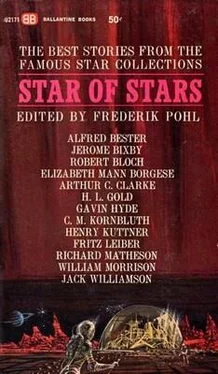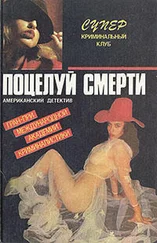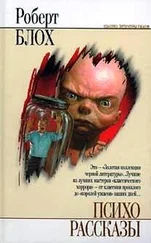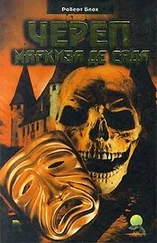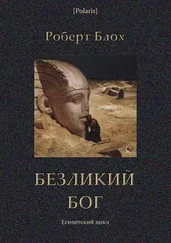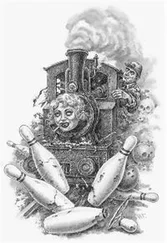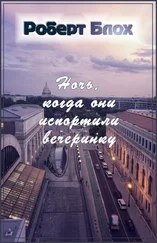He found it difficult to maintain a regular course, now, for the streets were choked with wrecked vehicles and the sidewalks often blocked by beams or the entire toppled fronts of buildings. Whole structures had been ripped apart, and here and there were freakish variations where a roof had fallen in or a single room smashed to expose its contents. Apparently the blow had come instantly, and without forewarning, for there were few bodies on the streets and those he glimpsed inside the opened buildings gave indication that death had found them in the midst of their natural occupations.
Here, in a gutted basement, a fat man sprawled over the table of his home workshop, his sightless eyes fixed upon the familiar calendar exhibiting entirely the charms of Marilyn Monroe. Two flights above him, through the empty frame of a bathroom window, one could see his wife, dead in the tub, her hand still clutching a movie magazine with a Rock Hudson portrait on the cover. And up in the attic, open to the sky, two young lovers stretched on a brass bed, locked naked in headless ecstasy.
He turned away, and as his progress continued he deliberately avoided looking at the bodies. But he could not, avoid seeing them now, and with familiarity the revulsion softened to the merest twinge. It then gave way to curiosity.
Passing a school playground he was pleased to see that the end had come without grotesque or unnatural violence. Probably a wave of paralyzing gas had swept through this area. Most of the figures were frozen upright in normal postures. Here were all of the aspects of ordinary childhood—the big kid punching the little kid, both leaning up against a fence where the blast had found them; a group of six youngsters in uniform black leather jackets piled upon the body of a child wearing a white leather jacket.
Beyond the playground loomed the center of the city. From a distance the mass of shattered masonry looked like a crazy garden-patch turned by a mad plowman. Here and there were tiny blossoms of flame sprouting forth from the interstices of huge clods, and at intervals he could see lopped, stemlike formations, the lower stories of sky-scrapers from which the tops had been sheared by the swish of a thermonuclear scythe.
He hesitated, wondering if it was practical to venture into this weird welter. Then he caught sight of the hillside beyond, and of the imposing structure which was the new Federal Building. It stood there, somehow miraculously untouched by the blast, and in the haze he could see the flag still fluttering from its roof. There would be life here, and he knew he would not be content until he reached it.
But long before he attained his objective, he found other evidences of continued existence. Moving delicately and deliberately through the debris, he became aware that he was not entirely alone here in the central chaos.
Wherever the flames flared and flickered, there were furtive figures moving against the fire. To his horror, he realized that they were actually kindling the blazes; burning away barricades that could not otherwise be removed, as they entered shops and stores to loot. Some of the scavengers were silent and ashamed, others were boisterous and drunken; all were doomed.
It was this knowledge which kept him from interfering. Let them plunder and pilfer at will, let them quarrel over the spoils in the shattered streets; in a few hours or a few days, radiation and fallout would take inevitable toll.
No one interfered with his passage; perhaps the helmet and protective garment resembled an official uniform. He went his way unhindered and saw:
A barefooted man wearing a mink coat, dashing through the door of a cocktail lounge and passing bottles out to a bucket-brigade of four small children—
An old woman standing in a bombed-out bank vault, sweeping stacks of bills into the street with her broom. Over in one corner lay the body of a white-haired man, his futile arms outstretched to embrace a heap of coins. Impatiently, the old woman nudged him with her broom. His head lolled, and a silver dollar popped out of his open mouth—
A soldier and a woman wearing the armband of the Red Cross, carrying a stretcher to the blocked entrance of a partially-razed church. Unable to enter, they bore the stretcher around to the side, and the soldier kicked in one of the stained-glass windows—
An artist's basement studio, open to the sky; its walls still intact and covered with abstract paintings. In the center of the room stood the easel, but the artist was gone. What was left of him was smeared across the canvas in a dripping mass, as though the artist had finally succeeded in putting something of himself into his picture—
A welter of glassware that had once been a chemical laboratory, and in the center of it a smocked figure slumped over a microscope. On the slide was a single cell which the scientists had been intently observing when the world crashed about his ears—
A woman with the face of a Vogue model, spread-eagled in the street. Apparently she had been struck down while answering the call of duty, for one slim, aristocratic hand still gripped the strap of her hatbox. Otherwise, due to some prank of explosion, the blast had stripped her quite naked; she lay there with all her expensive loveliness exposed—
A thin man, emerging from a pawnshop and carrying an enormous tuba. He disappeared momentarily into a meat market, next door, then came out again, the bell of his tuba stuffed with sausages—
A broadcasting studio, completely demolished, its once immaculate sound stage littered with the crumpled cartons of fifteen different varieties of America's Favorite Cigarette and the broken bottles of twenty brands of America's Favorite Beer. Protruding from the wreckage was the head of America's Favorite Quizmaster, eyes staring glassily at a sealed booth in the corner which now served as the coffin for a nine-year-old boy who had known the batting-averages of every team in the American and National Leagues since 1882—
A wild-eyed woman sitting in the street, crying and crooning over a kitten cradled in her arms—
A broker caught at his desk, his body mummified in coils of ticker-tapes—
A motor-bus, smashed into a brick wall; its passengers still jamming the aisles; standees clutching straps in rigor mortis—
The hindquarters of a stone lion before what had once been the Public Library; before it, on the steps, the corpse of an elderly lady whose shopping-bag had spewed its contents over the street—two murder-mysteries, a rental copy of Peyton Place, and the latest issue of the Reader's Digest—
A small boy wearing a cowboy hat, who levelled a toy pistol at his little sister and shouted, "Bang! You're dead!"
(She was.)
He walked slowly now, his pace impeded by obstacles both physical and of the spirit. He approached the building on the hillside by a circuitous route; avoiding repugnance, overcoming morbid curiosity, shunning pity, recoiling from horror, surmounting shock.
He knew there were others about him here in the city's core, some bent on acts of mercy, some on heroic rescue. But he ignored them all, for they were dead. Mercy had no meaning in this mist, and there was no rescue from radiation. Some of those who passed called out to him, but he went his way unheeding, knowing their words were mere death-rattles.
But suddenly, as he climbed the hillside, he was crying. The salty warmth ran down his cheeks and blurred the inner surface of his helmet so that he no longer saw anything clearly. And it was thus he emerged from the inner circle; the inner circle of the city, the inner circle of Dante's hell.
His tears ceased to flow and his vision cleared. Ahead of him was the proud outline of the Federal Building, shining and intact—or almost so.
Читать дальше
